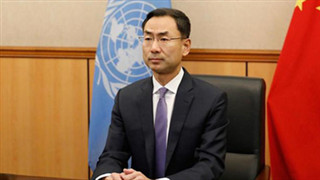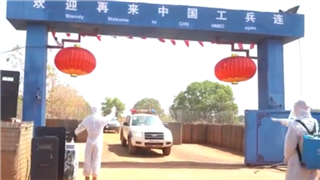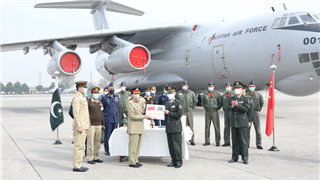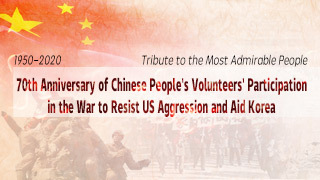YINCHUAN, Feb. 18 (Xinhua) -- Meng Debiao used to begin his day with a one-hour walk to fetch water in the wee hours, crossing over rugged mountains and standing in a long queue behind the well.
Meng, 58, hails from a village in Xiji county, Xihaigu Prefecture, which was once a highly impoverished area located in northwest China's Ningxia Hui Autonomous Region. Plagued by severe drought and a fragile ecological environment, the area was labeled by the United Nations as the "most unfit place for human settlement" in the 1970s.
Rainy days are precious, but they also brought nightmares to Meng's family of four which squeezed in a dilapidated mud hut with a broken roof. As the family's sole bread earner, Meng could never spare enough money to fix the roof.
Those harsh days are however a history now thanks to China's poverty eradication campaign that helped the counties in Xihaigu shake off absolute poverty last year. During the hard-won battle against poverty, the Mengs witnessed how their life has transformed step by step.
START WITH REGISTRATION
The poverty alleviation campaign kicked off in Xihaigu in 2014, when Meng was working at a construction site. He had to find odd jobs during the slack farming season to make up for the meagre income from farming. After being informed by village Party officials, he filed an application to join the campaign.
Meng was earning around 4,000 yuan (about 619.6 U.S. dollars) a year during that time, making the annual income of his family far below 2,730 yuan per person, the local baseline for absolute poverty in 2014.
Besides, he was also struggling to afford the tuition fees of his two children in high school and the constant medical expenses of his chronically ill wife.
After reviewing Meng's application, local officials visited his home to verify the actual conditions, said Wang Dongxuan, a poverty-alleviation official dispatched to Meng's village.
The 56-year-old Wang is among more than 3 million civil servants and volunteers sent to impoverished villages to battle poverty on the frontline.
After on-the-spot inspection and discussions, the village officials confirmed that the Mengs were qualified to be registered as a poverty-stricken household.
The preliminary decision was then approved by dozens of villagers' representatives at a meeting and posted on the village's bulletin board so that any objection could be voiced and heard before the decision was sent to upper-level governments.
After due process, the county government of Xiji approved Meng's application, making him eligible to avail the benefits from a host of poverty-alleviation policies under the campaign.
TARGETED MEASURES
The core of the poverty alleviation work is to implement targeted measures regarding the specific condition of each village and household to enable the poor population to earn more money.
In Xihaigu, the arid climate leads to low crop yields, but it turned out to be an ideal place for growing forage grass. After taking expert advice, Xiji county made growing grass and raising livestock its pillar industries in poverty alleviation.
But how could the poor households get the capital to start up a new occupation? The Chinese government rolled out a poverty alleviation credit system in 2014, allowing registered poor households to apply annually for a subsidized loan of up to 50,000 yuan, with a term of up to three years without guarantee or mortgage.
In 2015, Meng applied for a loan to buy some 20 black goats. He was also given an industrial subsidy of 10,000 yuan annually from the government for raising the goats.
The government also announced policies to reduce the cost of education, medical care and housing for rural households. The Mengs are covered by the basic medical insurance, which costs each member 30 yuan a year.
"Currently, over 90 percent of my wife's medical expenses are covered by the medical insurance," said Meng, acknowledging that without the poverty eradication policies, she couldn't have lived this long.
There are no more daily round-trips to the well, either. Water pipes were laid in Meng's yard five years ago.
The family spent 70,000 yuan to build a three-room brick house in 2017. The total include a 30,000-yuan subsidy from the local government for housing renovation. Rainy days are no longer an ordeal.
STRICT, SCIENTIFIC ASSESSMENT
After four years of effort with the help of preferential policies, Meng's household was ready to shake off poverty in 2018.
Local officials visited Meng's home again to check whether his household has met the basic poverty alleviation criteria, including per capita income, access to compulsory education, medical care and basic housing.
By then, Meng had 60 goats and the per capita disposable income of his family rose to more than 4,000 yuan per year, higher than the 3,400 yuan local poverty yardstick in 2018.
His two children had completed high school and were attending vocational college, each with a government subsidy of 3,000 yuan per year. The family's per capita housing space had also exceeded the national standard of 13 square meters.
However, it was not solely up to the officials to decide whether a household can be delisted from the poverty list. Villagers' representatives met to discuss the issue, and a preliminary conclusion was again published for public review and remarks.
Thereafter, the township government sent another team to Meng's home for re-assessment, before submitting his information for final approval at the county level.
"The entire process took about two months to ensure fairness and transparency and verify that every poor household has really got rid of poverty," said the dispatched official Wang.
Pang Jiaxing, an environmental expert from northwest China's Lanzhou University, has been a third-party assessor of poverty-alleviation work since 2016. He said China has established a scientific and strict set of rules for the assessment.
The third-party assessment begins when a county is about to announce its victory against poverty. During the process, the third-party team would randomly pick and visit any households across the county to see if they have met the standard of poverty alleviation.
"We would listen to both the officials and the poor households themselves," said Pang. "Whenever there was any inconsistency between what they said and what we saw during the field trip, we would turn to their neighbors for their opinions."
To consolidate the achievements of poverty reduction, China allowed those households that just shook off poverty to continue enjoying various supportive policies.
In 2019, the annual per capita income of Meng's family surpassed 10,000 yuan. Village officials still visited from time to time, enquiring if the family needed any other assistance.
SENSE OF ACHIEVEMENT
Meng can never forget the day when the village Party committee announced at an open meeting that his family is no longer classified as a poverty-stricken household.
"I'm truly grateful for the support from the Party and the government," said Meng. "My family finally got a good life."
The pursuit of vanquishing poverty has instilled a sense of purpose and confidence in Meng who is determined to secure a better future for his family.
"I've paid off all debts, and bought five more cows," said Meng. "I believe as long as I work hard, I can overcome any difficulty."











